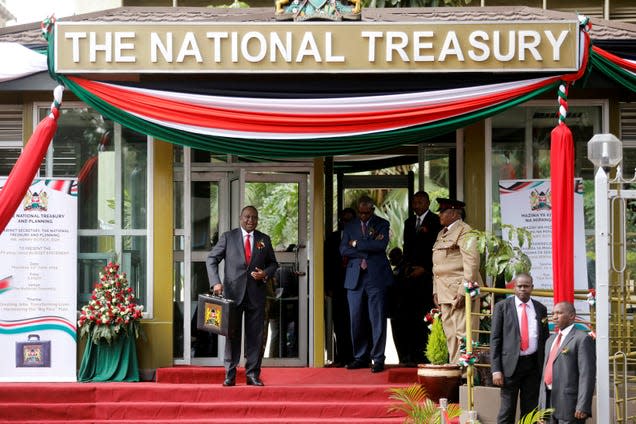Kenya's government is struggling even to pay its ministers

For the first time since it gained its independence in 1963, the government of Kenya has failed to pay its employees.
Ministers, legislators, and civil servants are yet to receive their March salaries. Most county government employees and some civil servants were last paid reportedly in January. The national treasury needs at least $434 million to pay salaries and pensions every month.
Read more
The meat industry blocked the IPCC’s attempt to recommend a plant-based diet
How GM got 5,000 workers to leave their jobs within a month without a single layoff
All pointers indicate that the crisis may persist for months. National treasury and economic planning cabinet secretary Njuguna Ndung’u has warned of tough times ahead, saying, the government is in a “financial fix.”
Desperate civil servants have threatened to go on strike—some government employees have already.
“We fear that this country is collapsing while we sit pretty, hoping for miracles,” said Opiyo Wandayi, Kenya’s national assembly minority leader.
Kenya has no money to pay salaries
Admitting that the government had no money, deputy president Rigathi Gachagua blamed the previous Uhuru Kenyatta administration’s “big appetite for loans” for the crisis. He also accused long-time opposition leader Raila Odinga of being in cahoots with the earlier government in precipitating it.
“They (Kenyatta government) borrowed money left, right, and center...Because we are a responsible government, we have to pay this money,” Gachagua said on April 9.
Odinga has, meanwhile, washed his hand off saying he was never part of the previous government. An opposition leader since 1992, Odinga, through demonstrations, pressured Kenyatta into a political solution dubbed “the handshake” in 2018.
The Orange Democratic Movement party leader has, however, said the “handshake” was only meant to ensure a conducive working environment for the government.
Wasteful spending is fueling a financial crisis
Kenya’s financial crunch and economic crisis have been in the making since at least the 2007-08 post-election violence, according to observers. The unrest largescale displacement set the tone for the national currency’s plunge and the World’s Bank’s falling macroeconomic outlook for the country, chasing away investors and destroying the agricultural value chain.
A weakening shilling and escalating cost of living made citizens’ lives difficult. Things remained wobbly ever after president William Ruto took office in September 2022 promising economic stability.
However, his government’s wasteful spending was called out yesterday (April 10) by David Ndii, chair of the president’s council of economic advisers. Meanwhile, the country reportedly loses at least $18 million every day to corruption.
Ndii, however, downplayed the ongoing crisis saying it was not overly alarming.
David Ndii: Government is extremely wasteful, there is not a single day that I am not exasperated by not just how wasteful it is but by how deliberate it is and how unbothered people are #MondayReport @WaihigaMwaura pic.twitter.com/lfkReXygQC
— Citizen TV Kenya (@citizentvkenya) April 10, 2023
The salary crisis, he said, indicated an operational liquidity crunch and that the government was constantly raising funds to refinance bills and bonds. The dues will be cleared in the coming weeks, according to him, as the government had secured hundreds of millions of dollars in loans.
More from Quartz
Sign up for Quartz's Newsletter. For the latest news, Facebook, Twitter and Instagram.

